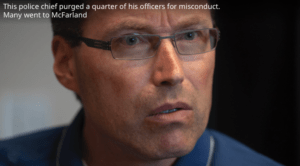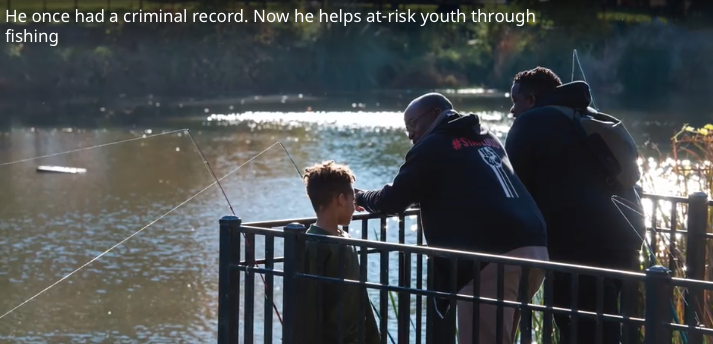
‘Clean slate’ laws in America
How effective are new laws that erase criminal records? Take a look at the racial justice movement taking hold across California and the U.S. that aims to allow former felons to find a better life.
Timothy Poole has been out of prison — and out of the drug dealing business — for more than 20 years. In Sacramento, he is well known for his efforts to quell gun violence and for his visits with families of victims of violence. He heads his own nonprofit, Hooked on Fishing not on Violence, for years teaching kids how to fish in local rivers as a way of staying out of trouble.
But when Poole wanted to bring his message of peace and hope into classrooms in the Sacramento public schools as a volunteer, he worried he would hit a wall. As is the case in many school systems across the country, people with felony records are frequently barred from employment and unpaid volunteer work.
After more than 20 years of leading a crime-free life, Poole said those laws were unfairly holding him back.
“I made mistakes more than 30 years ago,” said Poole, 56. “I knew there was something greater for me to do in life.”
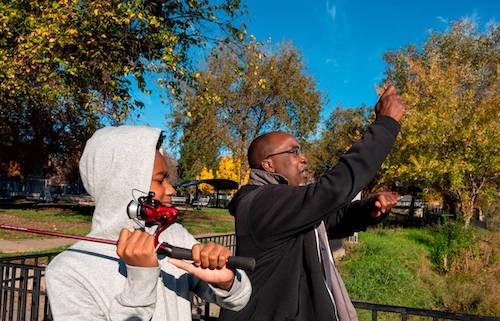
Having a criminal record — even for a minor offense that happened long ago — can cause lifelong problems. The record can make it difficult to get a job, find housing, get a business loan, attend college and volunteer at your child’s school. It can disqualify you from voting and serving on a jury. Even records that show charges were dropped or a person was found innocent can be a barrier to getting ahead.
A movement to counter these challenges by removing criminal records from public view is taking hold across the U.S. Forty-five states, the District of Columbia and Puerto Rico have some form of record removal, which puts criminal records of varying types out of reach of the general public while usually allowing police, prosecutors and judges to retain access.
But the effort is not without controversy. While advocates for record removal say the process is crucial to enabling people to have a fresh start, government advocates, defense lawyers, journalists and civil society groups debate about what the loss of records and data means as they try to make the American justice system more equitable and accountable.
Several researchers have estimated that as many as 100 million people in the U.S. have some type of criminal record and that one in three adults in the U.S. has been arrested by the age of 23. At least 650,000 people are released from prison annually in the U.S., federal data show.
California is among 23 states that allow some felonies to be erased from public view in a system known as setting aside and dismissing the convictions, which then means they will not show up on a background check. Starting in 2022, for certain lower-level crimes, record erasure in California will occur automatically. California will join at least three other states — Connecticut, Pennsylvania and Utah — in putting in place such a system. Delaware’s governor signed similar legislation in November, which will take effect in 2024.
Working with Leon Dixson, who manages an expungement project for Legal Services of Northern California, Poole was able to get his record erased in 2019, about six months after applying in 2018, and thus was able to talk to children in schools about leading non-violent lives.
“I am an ex-felon,” Poole said. “I had four cases for sales of marijuana and sales of cocaine. I needed to get them expunged to move forward in my life.”
But Poole is luckier than many. Thousands of other people across the U.S. who long ago gave up criminal behavior have had a much more difficult time shedding the records of their criminal past.
Most states allow the removal of a criminal record, through a court-imposed seal or some other way that prevents access by the general public. But it can be an expensive and time-consuming process. A study published in 2020 about the frequency of record removal in Michigan found that a small fraction of those eligible — 6.5% — had gotten their records removed.
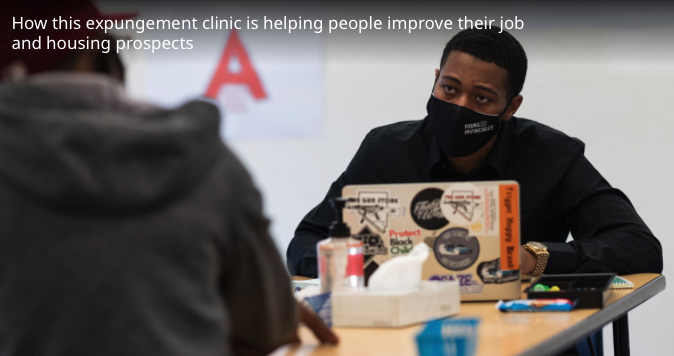
The background check industry, which has revenues totaling more than $2 billion annually in the U.S., can obtain any criminal records as long as they are in the public domain. Companies regularly scrape sources of public records — court cases, arrests, financial information and bankruptcy filings, among others — to provide a profile to a client seeking to check out someone’s background before hiring them, making a loan or renting an apartment.
Support for record removal is often linked by advocates to decades of police practices that have resulted in large groups of people — often people of color — having records for relatively minor violations that continue to haunt them.
There is a “culture of over-policing,” said Washington, D.C., council member Christina Henderson, a Democrat, in a hearing this year. “Even for charges dropped, they often lead to paper trails that are long-lasting barriers to employment and housing.”
Patrice Sulton, founder of the DC Justice Lab, which works to make record removal easier in the District of Columbia, said it’s an issue that is centered on racial justice because of the disproportionate number of people of color with criminal records.
“So many of the records that we try to get expunged are bogus in the first place. They get ‘no papered,’ and have misinformation in them. They are so old they serve no purpose. They should not exist.”
For many, the shadow of an arrest stretches over decades. Claudette Colvin, a Black woman, was arrested in Montgomery, Ala., in 1955 for refusing to give up her seat on a bus to a white woman. Now, at age 82, Colvin has petitioned to get the record of her arrest expunged — and the judge handling the case said that is exactly what he will do.
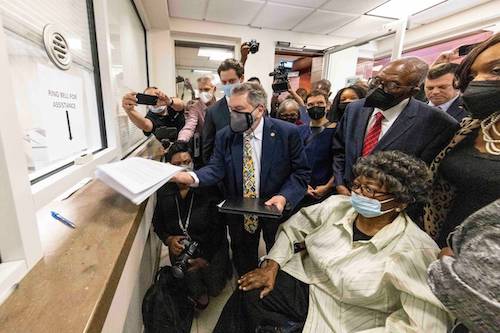
THE DOWNSIDE OF RECORD REMOVAL
For some, record removal has a distinct downside. While the public’s attention has been focused on police misconduct, resulting in increased public pressure for a national effort to rethink a criminal justice system that has long discriminated against people of color and poor people, getting rid of records could actually stand in the way.
The data will disappear, the names of the accused and the police who accused them will be wiped away, and this will effectively erase enormous troves of information that could be used to identify poor police practices and help bring about reform.
Mike Tadych, a First Amendment lawyer in North Carolina, is concerned about the consequences record removal could have on efforts to keep law enforcement accountable to the public.
“We are at a crossroads. I don’t know where it ends up. Will it swing too far as it always does? And then move back towards the center?” he said.
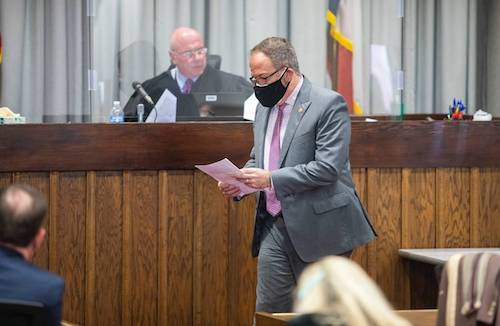
Getting rid of records or parking them in an online vault out of public view eliminates access to data with valuable clues to discriminatory police practices and problems in the court system.
Records of arrests, dropped charges, prosecutions and convictions can offer a font of information about discriminatory police practices, enable a lawyer to get a client exonerated or allow someone seeking a protection order in a domestic violence case to show that the accused has a relevant criminal history.
This data already has been used to show that the criminal justice system in the U.S. has a disproportionate effect on people of color. A report in 2019 from the U.S. Commission on Civil Rights found that Black people in 2017 represented 13.4% of the U.S. population, but 27.2% of all arrests by law enforcement, while white people represented about 76.6% of the population and 68.9% of arrests.
“For certain offenses, the disparities were particularly striking: (B)lack people represented 31.8 percent of arrests for disorderly conduct and 40.5 of arrests for curfew and loitering violations, whereas white people represented 62.9 percent and 56.0 percent of arrests for such offenses, respectively,” the report said.
Similarly, people identifying as Hispanic or Latino represented 18.1% of the population but 20.8% of arrests for curfew and loitering violations and 19.8% of drug abuse offenses, the civil rights commission found.
“Racial disparity … permeates every stage of the United States criminal justice system,” said a separate report from The Sentencing Project, whose findings, like those of the civil rights commission, were based on publicly available data.
In most states, even if the public is barred from seeing the records as part of fresh start efforts, police, prosecutors and judges usually retain access to the records, giving the law enforcement community a distinct advantage.
DOMESTIC VIOLENCE AND THE VALUE OF RECORDS
The movement for record removal has caused consternation among some who advocate for victims of domestic violence. They point out that a lack of information from police files, including those that resulted in no charges, could impede someone trying to get a protection order in a domestic violence case, since victims of domestic violence often have numerous interactions with the police before finally deciding to file charges.
Many people who complain to the police about domestic violence often withdraw their complaints because they are financially and emotionally dependent on the alleged perpetrators and are fearful of repercussions.
Naida Henao, managing counsel for strategic advocacy and communication at the Network for Victim Recovery of D.C. said that removing records is “taking away pieces that we refer to as ‘the mosaic,’ that help inform what is going on between the defendant and the survivor.”
Record removal, she said, “limits a survivor’s ability to point to someone’s past.”
If someone has violated a protective order or failed to appear for a meeting with a probation officer, for instance, “this person does not have a tendency to follow court orders,” Henao said.
And that can put the person who has filed a request for a protective order at risk. ”It shows they have a credible fear for their safety,” she said.
A history of arrests, charges and convictions are also useful in family law cases to support grounds for divorce, custody and visitation, and financial support. Record removal also can impede the ability of government agencies to do background checks for someone who wants a firearm permit, if they have been convicted of misdemeanor crimes involving domestic violence, but those records have been removed from public view.
“We have to strike this balance, have to talk to victims groups and defendants’ groups to find middle ground. We cannot just completely automatically seal all these things without thought or impact on survivors,” Henao said.
Sharon Weidenfeld is a private investigator in Maryland who has scoured arrest and prosecution records for information that has led to the exoneration of people wrongly accused. She relies on these records because they can show that a police officer has repeatedly charged people with resisting arrest or assaulting a police officer.
That type of record, she said, “can often be a red flag that the person being charged actually was beaten up by the police,” but slapped with criminal charges to cover up the police misconduct. Or charges of disorderly conduct or assaulting a police officer may have been used to control or intimidate people whom officers may suspect of doing something wrong, but don’t have evidence, she said.
Eliminating public access to individual criminal records — especially records of low-level crimes such as jaywalking or disorderly conduct, which are often used by police to pressure people and neighborhoods — could result in the loss of important data that can show patterns of police misconduct, or sloppy work by prosecutors, or disparate sentencing by particular judges that favor one group or race over another.
How would the civil rights commission or The Sentencing Project, a nonprofit pushing for changes to make the criminal justice system operate more equitably, mine that data for the very findings that show that the criminal justice system is disproportionately punishing people of color? How would defense lawyers double check someone’s testimony or verify a police account of an arrest?
Some academic researchers have suggested that keeping the data publicly available, but erasing the name of the person arrested would take care of that. But that would make it more difficult to verify the data, and those seeking that information would have to rely on the very agencies for whom the data with names attached could tell a damning story.
“Why should police, prosecutors and the judiciary continue to have easy access, but those people who come into contact with the criminal justice system or want to check on its fairness and accuracy face major barriers to obtaining the same information? This also closes off exoneration options,” Weidenfeld said.
Similarly, Jennifer Nelson, senior attorney with the Reporters Committee for Freedom of the Press, said limiting public access to records could hamper news organizations and civil society groups seeking to expose problems in the criminal justice system.
“We understand that the inspiration behind bills like this are good, and address a real problem,” she said. “But the effects of it are to allow the perpetuation of the problem.”
The risk, she said, is that bad behavior and illegal actions by law enforcement will “continue with impunity. They know the records are not going to be there forever for someone to look over.”
RECORD REMOVAL GAINS MOMENTUM
Despite these challenges, the movement for record removal is gaining momentum in the United States. Advocates for record removal say there are good reasons to keep moving forward.
The U.S. leads the world in incarceration, a distinction that disproportionately affects communities of color; lesbian, gay, bisexual and transgender people; and people with histories of suffering from abuse or experiencing mental illness, according to The Sentencing Project.
Unemployment hovered around 27% for people who were released from prison, a study by The Prison Policy Institute found. In 2018, the think tank compiled what it said is the first national data set about the unemployment rate among formerly incarcerated people. By contrast, the national unemployment rate, at the height of pandemic layoffs in 2020, peaked at around 14.8%, according to the Congressional Research Service.
Difficulty finding a job is a frequent complaint of formerly incarcerated people and people who have an arrest record, even for those whose charges are dropped or who are acquitted in a trial.
Although some of the challenges “may be responsive to legitimate public safety concerns,” others are unnecessary and may contribute to poverty and recidivism, said the Council of State Governments Justice Center.
Getting a license for fields such as hairstyling, health care or plumbing can be out of reach for someone with a criminal record. And if you want to start your own business, but have a criminal record, getting a loan can be especially tough. Never mind that the conviction had nothing to do with hairstyling, health care or plumbing. It’s the residue of a record, usually a felony, that causes long-lasting difficulties.
Troy Burner, a Black man who was imprisoned for 24 and a half years after being wrongly convicted for aiding and abetting others in a murder case, said his record continues to follow him, even though he was exonerated after a key witness recanted and admitted Burner wasn’t at the scene of the crime.
“You are serving a sentence, and on its face, your sentence is over, but the sentence is continuing to string you along, and you still have to pay for the sins of the past that you already paid for. In my case, I paid for the sins of others.”
Burner went to prison when he was 21; he was exonerated and then released when he was 46, having served time for a crime he did not commit.
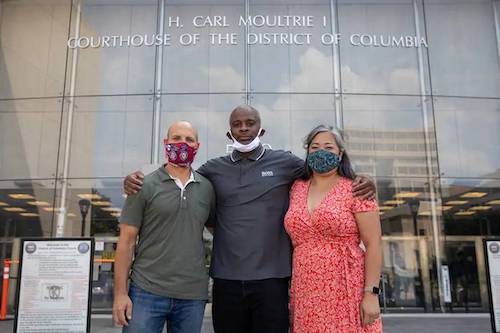
Burner, 49, who has worked for a reentry program in Washington, D.C., and recently joined the Justice Policy Institute, which researches criminal justice issues, hopes to start his own nonprofit to help others reenter their communities after prison. He has had difficulty finding full-time work, and said he can’t put his name on a lease. He has been bolstered by supportive family and friends. “But a lot of people don’t have that.”
The “stain of incarceration,” Burner said, “is not conducive to progress for the individual, the community or for reducing recidivism.”
IS BAN THE BOX A SOLUTION?
That stain is not supposed to crop up in early job screenings in the 36 states and the District of Columbia that forbid employers from asking prospective employees early in the vetting process about a criminal past. These measures, known as “Ban the Box,” laws, refer to a box to check on a job application asking if the applicant has a criminal record. A federal “Ban the Box’‘ law is slated to take effect in late 2021, affecting federal agencies and their private-sector contractors.
But critics say “Ban the Box” laws are nearly impossible to enforce. If an employer asks about a criminal background early in the vetting process, that is often illegal. But what is the prospective employee going to do? The applicant isn’t going to waste time suing, or challenging the rejection, but instead will move on with their job hunting.
“Ban the box just kicks the can down the road,” said Margaret Colgate Love, a former U.S. pardon attorney who has studied record erasure laws and has urged lawmakers across the country to consider ways of eliminating the fallout from having a record.
The laws don’t prevent a prospective employer from eventually conducting a background check that could turn up a criminal record. The laws usually only apply to employment, so landlords have more leeway to inquire about a criminal past. Seattle recently enacted one of the first-in-the-nation laws to prevent landlords from asking about certain criminal records, and the law survived a legal challenge spearheaded by the Pacific Legal Foundation, which claimed it had interfered with a landlord’s First Amendment rights.
Some scholars and advocates say that Ban the Box laws have backfired. The lack of information about a criminal record has led to some employers imposing what researchers have dubbed “statistical discrimination,” in which employers assume that a Black person has a criminal record and that a white person does not, said a report from the U.S. Commission on Civil Rights.
When employers were barred from asking if an applicant had committed a crime, they were more likely to discriminate against Black applicants, with the race gap for callbacks between similar white applicants and people of color increasing from 7% to 45%, according to a study by Rutgers University economics professor Amanda Agan, and University of Michigan law professor Sonja Starr, who is now at the University of Chicago.
Under most Ban the Box laws, employers may still perform criminal background checks, but not in the initial screening. But it is at this point that statistical discrimination can occur when employers are surmising that a Black person has a record.
“People who are really paying the prices are Black males with and without convictions,” said Ben Hansen, an economics professor at the University of Oregon who said Ban the Box works well, but only if you are white.
CRIMINAL RECORD DOES NOT DETERMINE TO JOB PERFORMANCE
While most states allow some type of record removal, at least from the general public, there is often a long lag time between completion of a sentence and record erasure.
But it may be that the gap in employment, or only holding jobs in the gig economy that may not require a background check, can harm a job seeker as much as having a criminal record, Agan said. In the period before someone can have their record removed — three to seven years in most states — “during that time you are accumulating potential scars from that criminal record,” she said.
“It almost doesn’t matter if you have had a criminal record,” she said. The problem morphs into deficits and gaps in job history, and the reason for that may be less important than the deficits and gaps, she said. Her studies and those of others have shown “very little evidence about association between a criminal record and how good you are on the job. But employers think there is.”
She said that after two to three years, someone who has served time in prison but has not been accused of a crime since is essentially at the same risk level as someone without a record. “Their risk of a future conviction is the same as the general public,” Agan said.
Yet that data is largely ignored, or not well known, she said. And lack of a job can lead to impoverishment, which according to the Prison Policy Initiative, can be a key factor that leads someone to commit a crime and return to prison.
All of these challenges have increased pressure on state legislatures and Congress to intensify efforts to get rid of records from people who are deemed unlikely to commit a future crime because they have stayed out of trouble for several years.
In 2019, Pennsylvania became the first state to create an automated system to clear records, allowing the automatic sealing of records when charges are dropped or there is an acquittal. The law has since been amended to allow automatic sealing of most lesser convictions after 10 years, including drunk driving, prostitution, shoplifting and loitering if there is no repeat offense.
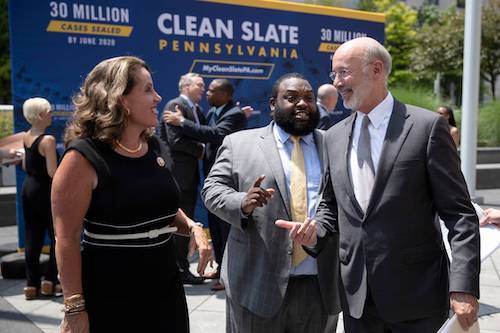
Laws differ from state to state; Utah’s automatic sealing law only applies to misdemeanors and traffic violations; New Jersey has a waiting period similar to Michigan, and both states have some violations ineligible for automatic erasure. Virginia allows automatic sealing for non-convictions and some misdemeanors, including marijuana possession.
Sharon Dietrich, a legal aid lawyer in Philadelphia who was a key leader in Pennsylvania’s automatic record sealing movement, said she had come to see automatic sealing as the only way to create lasting change for people with minor criminal records.
“You have someone who had one really bad day, and that is essentially ruining their lives. There are very critical consequences for those people who have these records,” she said.
The previous system allowed record sealing, but required a judge to approve it. Dietrich said she and her colleagues could do about 1,000 cases a year; meanwhile thousands of people were getting arrested for minor offenses, causing the legal system to fall further and further behind, not only in hearing those cases, but also in responding to requests for record sealing.
Jenny Roberts, a law professor at American University, said the balancing act should be weighted toward the person with a record. “I do think social good outweighs; there is a way to set this up so that all interests are met sufficiently. The harm to the individual is much greater than the harm to society.”
For David Shuster, getting rid of his record for drug crimes in the San Jose area was a preemptive strike.
In 2009, he decided to stop using drugs and attended Narcotics Anonymous meetings twice a week. He voluntarily joined the Dependency Drug Treatment Court, a program run with the Santa Clara County Family Wellness Court. He also found support at the Dependency Advocacy Center where he now works, a counseling center that pairs mentors with parents recovering from addiction.
In 2020, Shuster successfully expunged his criminal record — six convictions spanning from 1999 to 2009. Before then, a routine background check by a lender or an employer could have found his four traffic violations and two felony drug charges.
And while his record hadn’t been a huge roadblock to him yet, Shuster feared it might one day keep him from obtaining a small business loan.
“I figured if I wanted to start my own business, I need a clean record,” he said. “My mistakes from the past shouldn’t hold me back … and those charges … at some point would rear its head and stop me from moving forward.”




